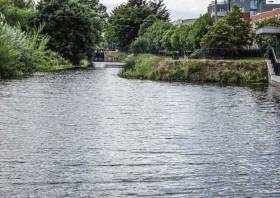Displaying items by tag: Leptospirosis
Waterways Ireland Warns Of Reported Leptospirosis On Royal Canal
Waterways Ireland have been notified by the HSE of a number of cases of Leptospirosis reported recently following exposure to the water on the Royal Canal in North Dublin.
Individuals are instructed not to engage in swimming, diving or immersive activity such as deliberate capsizing in the waterway pending further advisory.
Any facilities/activity providers are also requested to ensure, to the best of their ability, that clients do not engage in the same activities.
The HSE further advises all individuals partaking in watersport (and in turn for activity providers to advise their clients) of the risk, which is small but real, of acquiring Leptospirosis from water-based activities.
Persons with symptoms (a flu-like illness) within a three-week period after engaging in a water-based activity should seek medical attention immediately, mentioning any watercourse exposure.
Further information on Leptospirosis is available from the HSE website. Other enquiries can be directed to [email protected] or by contacting the Waterways Ireland Communications Office on 071-9650787.
What is Leptospirosis?
Leptospirosis is a bacterial infection frequently found both in domestic and wild animals, which can spread to humans. Leptospirosis in Ireland is usually picked up from rats. The infection is spread through contact with rats, or rat urine generally.
Leptospirosis is a recreational hazard for those who participate in outdoor sports in contaminated areas and has been associated with water sports.
Occupations at risk would include veterinary surgeons, farmers, meat inspectors, butchers, abattoir and sewer workers.
High-risk water includes stagnant, dirty-looking or obviously polluted fresh water found in ditches, drains, ponds, lakes or rivers. Sea water poses less risk.
What precautions should I take?
- Do not go swimming or boating in water which is known to be or obviously polluted.
- Cover any cuts or abrasions with a waterproof dressing while swimming or canoeing.
- Shower thoroughly as soon as possible following water activities.
- Make sure the sporting clothing you wear minimises your contact with water.
- Wash your hands after water activity, handling any animal or contaminated clothing and always before eating, drinking or smoking.
- Clean any cuts acquired during swimming, fishing or other near-water activities. Apply first aid as soon as possible.
Rinsing dogs who have been swimming in high risk water reduces the risk of infection. - High-risk workers should always wear their personal protective equipment and clothing at all times when in high risk situations.
- If you get a flu-like illness within a three-week period after engaging in any of these activities you should visit your doctor immediately, and tell her or him of your concerns and possible exposure to dirty or stagnant water.





























































